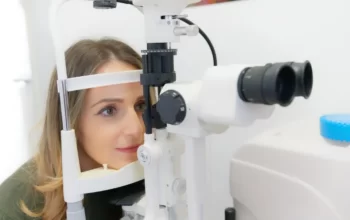
Navigating around the vision problems caused by cataracts can be challenging enough. Because of cataracts, things appear hazy, dull, or blurry. You could experience double vision and an increase in light sensitivity as a result. Can you also get headaches from an eye with a cloudy lens, though?
What Signs Might Someone Have Cataracts?
Are you worried that you might have cataracts? If so, you may be wondering, Cataract symptoms vary from person to person, but you’re more likely to experience any of the following symptoms long before you experience a cataract-induced headache:
- Blurred, cloudy, or double vision
- Difficulty seeing at night
- Fading or yellowing of colors
- Frequent prescription changes
- Halos
- Light sensitivity
Vision Problems
Getting a vision test is one of the first things you should do if you frequently suffer from headaches. This is due to the fact that a number of common vision disorders have migraines as a symptom. Among the conditions that cause headaches are:
- Farsightedness or presbyopia (difficulty seeing objects up close)
- Nearsightedness (difficulty seeing objects far away)
- Astigmatism (blurry vision at all distances)
- Monocular vision (when one eye adopts the majority of visual tasks)
Typically, to make up for these issues, your eyes will have to work harder to focus, which results in migraines. These problems can be resolved with the aid of eyeglasses, contact lenses, and refractive surgery. Even if it turns out that these issues are not what’s causing your headaches, at least you’ll be able to see better!
General Eye Strain
Instead of being the result of a persistent visual impairment, eye strain can also be brought on by bad habits or your workplace. People who work in dimly lit environments or who spend all day staring at a computer screen are most likely to experience eye strain.
Most of the time, simple interventions can help these problems. Every half-hour or so, take a minute to look at something different to give your eyes a break from the computer screen. In order to prevent eye strain in the dark, add a lamp or other light source whenever you can.
Does A Relationship Exist Between Cataracts And Headaches?
Although it is true that most people do not experience headaches as a result of cataracts, there may be a link in some cases. Cataracts typically cause little to no vision impairment in the early stages. However, as cataracts worsen and a person’s vision becomes more obscured, they will have to work harder to see clearly, squinting and holding things close to their faces to read them. Because of this, they might begin to experience headaches from eye strain. The overuse of the eyes can also exacerbate existing headaches in people who are already predisposed to them or even start new ones. To say that cataracts cause headaches is not the same thing, though, as I said before.
Although having cataract surgery may not completely cure the patient’s headaches, it may significantly lessen their frequency or intensity by easing the strain on their eyes.
Treatment For Cataracts
There are a number of lifestyle adjustments that could aid in managing cataracts and their side effects. To accommodate changes in your prescription, make sure to purchase the appropriate eyeglasses or contact lenses.
Use lights that are brighter when reading to reduce strain. Additionally useful is a magnifying glass. Limit your nighttime driving once you start experiencing issues with glare, halos, or night vision.
These precautions might not be sufficient in the future to prevent cataracts from negatively impacting your life. Consider having cataract surgery when it becomes difficult to engage in your normal activities.

Ocular Migraines Brought On By Cataracts?
No, cataracts don’t bring on ocular migraines. Blood flow in the eye’s blood vessels is reduced, which leads to ocular migraines. While ocular migraines may result in blurred vision that’s not entirely dissimilar to the blurred vision caused by cataracts, the blurred vision caused by ocular migraines should subside along with the migraine.
More Serious Eye Conditions
People who experience headaches may also want to have their eyes examined for glaucoma and cataracts. While cloudy vision and difficulty seeing at night are the main signs of cataracts, some cataract patients also experience headaches when their eyes work too hard to fix these issues. A buildup of fluid that cannot escape from the eye leads to glaucoma. Pressure behind the eyes is created by this extra fluid, and headaches may result.
Patients with cataracts and glaucoma are treated by Access Eye, which should enhance their eyesight and reduce headaches caused by the conditions.
When To Seek Medical Attention
Right after cataract surgery, it’s normal to experience some discomfort, swelling, redness, irritation, and vision clarity problems. Within hours of surgery, you should start to see improvement in your symptoms and vision. Your eye may need up to four to six weeks to fully recover from the procedure before your vision returns to normal.
Significant side effects from cataract surgery are uncommon. Nine out of ten people who undergo cataract surgery report feeling more satisfied with the outcome.
If you experience any of the following after cataract surgery, you need to talk to your doctor right away:
- Vision loss or declining vision
- Pain that cannot be managed with over-the-counter medications or pain that is persistent and significant
- Floaters or “spots” in your field of vision
- Increasing redness
- Swelling that does not go down and/or gets worse
It is typical to feel some moderate pain after cataract surgery, but it usually subsides within the first 24 hours of being discharged. Then, over the following few days and weeks, it will keep getting better.
After cataract surgery, if you experience excruciating pain or a crippling headache, seek immediate medical attention and notify your ophthalmologist as soon as you can.



